Iran Sentences Belgian Aid Worker To 28 Years In Prison

Belgian officials say the Islamic Republic of Iran has imposed a 28-year sentence on jailed aid worker Olivier Vandecasteele.

Belgian officials say the Islamic Republic of Iran has imposed a 28-year sentence on jailed aid worker Olivier Vandecasteele.
Belgium’s Justice Minister said on Wednesday that Vandecasteele has been sentenced for a “fabricated series of crimes”, stressing that Brussels was doing everything possible to secure his release.
Justice Minister Vincent Van Quickenborne said in parliament that Vandencasteele had been sentenced as retribution for a jail sentence the country imposed on a former Iranian diplomat last year convicted on terror charges.
“This is a compatriot who was innocently arrested in February and has been held under inhumane conditions since,” he added.
The sentence was announced less than 24 hours after a phone conversation between the foreign ministers of Iran and Belgium, the AFP reported.
The detention could be another example of the often-used Iranian tactic of imprisoning foreigners as hostages to exchange them with certain Iranians jailed in Western countries.
Vandecasteele, 41, has served in various international humanitarian organizations since at least 2006, including, Médecins du Monde, Norwegian Refugee Council (NRC), and Relief International.
In July 2021, Relief International ended its relationship with Vandecasteele.
He, however, later returned to Iran on a tourist visa to visit a friend. It is possible that his return to Iran was an arranged trap by Iranian intelligence to detain and exchange him with Assadollah Assadi.
Assadollah Assadi is serving a 20-year prison sentence in Belgium for planning a terror attack in Paris four years ago.
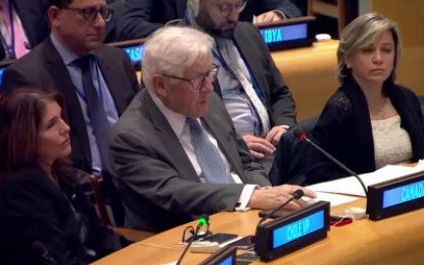
The Islamic Republic was voted out from the United Nations Commission on the Status of Women (CSW) for policies contrary to the rights of women and girls.
On Wednesday, members of the UN Economic and Social Council (ECOSOC) adopted a US-drafted resolution to "remove with immediate effect the Islamic Republic of Iran from the Commission on the Status of Women for the remainder of its 2022-2026 term" over the regime’s bloody crackdown on protests ignited by the death of a young woman in custody of hijab – or the so-called “morality” -- police.
“This vote is another sign of the growing international consensus on Iran and demands for accountability,” US National Security Advisor Jake Sullivan said after the vote.
The Commission on the Status of Women (CSW) is the principal global intergovernmental body exclusively dedicated to the promotion of gender equality and the empowerment of women.
Out of the 54-member body, 29 members voted in favor of the resolution while eight voted against and 16 countries abstained. The Islamic Republic itself, Palestine, Syria, Cuba, China, Russia, Eritrea, Belarus, Zimbabwe, and North Korea voted to keep Iran in the body.
The vote was the first time in United Nations history that a country was expelled from the commission.
It was the second step against the Islamic Republic’s violations of human rights during the current wave of protests. The first step by the United Nations to hold the Islamic Republic accountable for its crackdown on protesters was creating a fact-finding mission by the Human Rights Council. The Geneva-based UN Human Rights Council voted on November 24 to launch an independent investigation into the regime’s deadly repression of protests that has killed around 500 civilians, including about 60 children.
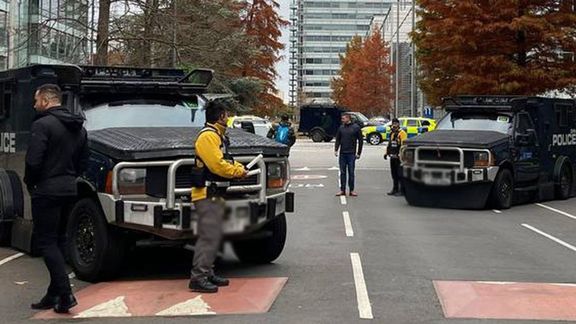
Amid repeated threats by the Islamic Republic against Iran International’s reporters, the UK has vowed to step up protection of London-based journalists.
British Foreign Minister James Cleverly said during a session at the parliament on Tuesday that the Foreign and Commonwealth Development Office (FCDO), in partnership with the Home Office, had ensured that the Iranian journalists were protected by the British police.
“The UK remains absolutely determined to ensure that Iran does not intimidate people within this country. We will always stand up to the aggression from foreign nations,” he noted, adding, “We will absolutely not tolerate threats, particularly towards journalists who are highlighting what is going on in Iran, or indeed any other individual living in the UK.”
One day later, Iran’s Intelligence Minister Esmail Khatib in a television interview repeated threats to “punish all those” who had a role in popular protests against the regime, wherever they might be.
Khatib on November 9 had said the Islamic Republic regards Iran International as “a terrorist organization,” adding that its workers and anyone affiliated with the channel will be pursued by the Ministry of Intelligence all over the globe.
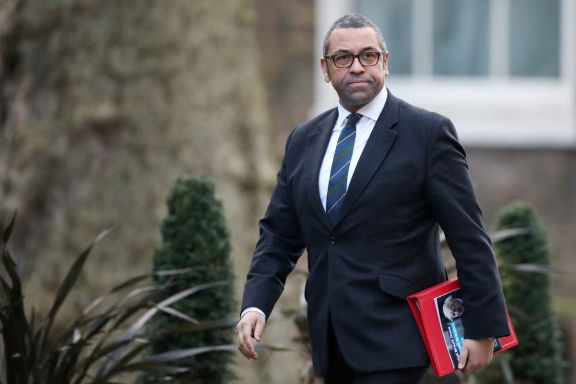
In November, Volant Media, the parent company of Iran International, said that two of its journalists had been notified of direct threats. It said in a statement the Metropolitan Police had formally notified both journalists that these threats represent an imminent, credible and significant risk to their lives and those of their families. Ken McCallum — the head of MI5, the UK’s domestic counter-intelligence and security agency -- said on November 16 that UK authorities have discovered at least 10 “potential threats” since January to “kidnap or even kill British or UK-based individuals perceived as enemies of the regime.”
Expressing the UK’s commitment to hold the Islamic Republic to account, Cleverly said, “These protests in Iran are a watershed moment. After years of repression, the Iranian people have clearly had enough. They are standing up to the authoritarian regime under which they live. Sadly, the regime has responded in the only way it knows: with violence.”
He went on to say the UK has imposed more than 300 sanctions -- including sanctioning the Islamic Revolutionary Guard in its entirety, adding “We will continue to work with partners to challenge the regime’s aggression at home and its disruptive behavior in the region.”
Declining to disclose plans to hit the Revolutionary Guards (IRGC) with further punitive measures after Iran International staff were given armed police protection, he said that it was “counterproductive to detail what future sanctions and designations might be brought in to ensure that the targets of those sanctions do not in any way try to evade the sanctions before they’re brought in”.
Also on Tuesday, UK security minister Tom Tugendhat said that Britain is facing growing interference, threats and influence from state actors including Iran, warning the “emerging era of state-based threats” poses “a challenge to our future and to our society” as well as to freedom of speech in the UK and residents' way of life. “They are threats not just to life — they are threats to our way of life,” he said at London-based think tank Policy Exchange.
The security minister said the Islamic regime’s crackdown on anyone it perceives as a threat to its authority had extended to Britain, noting that “Iran's malign behavior in the Middle East directly threatens our partners and our interests.”
“They are brutally suppressing courageous people in the streets who are calling for an end to the control of a corrupt and corrupted religious security elite claiming authority from God. All of this is clear, much of it has been clear for some time. What’s new is that we’re seeing this grow at home,” he said.
“Since Ken McCallum’s speech just a few weeks ago we’ve seen even more out of Iran,” Tugendhat said. “This is not and has not yet finished.”
Faced with nationwide antigovernment protests since mid-September, the Islamic Republic has blamed foreign-based Persian broadcasters such as BBC Persian and Iran International of “fomenting unrest”, while all media in the country are under tight government control and present protesters as “rioters” and “terrorists”.
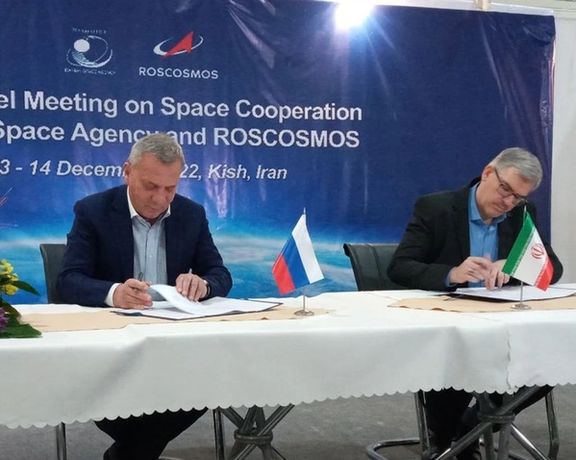
As the world expresses concerns over close military cooperation between Iran and Russia, they have signed a new agreement on cooperation in the space industry.
According to ISNA in Tehran, the two sides have agreed to jointly design and construct remote sensing and telecommunication satellites.
Joint development of infrastructure as well as holding training courses in this regard are among the other details of an agreement revealed on Wednesday.
The document was signed Wednesday by Iran’s head of Space Agency Hassan Salarieh and his Russian counterpart Yury Borisov on the sidelines of an International Aerospace Exhibition in the Kish Island in southern Iran.
Earlier in August, Iran launched a satellite called Khayyam into space from the Baikonur space station in Kazakhstan using Russia's Soyuz satellite carrier rocket.
The UK on Tuesday sanctioned 12 Russian military officials involved in missile strikes on Ukrainian cities as well as some Iranian businessmen involved in the production and supply of military drones used in the attacks.
The EU foreign ministers also lashed out at the Iranian regime Monday for supplying drones to Russia, saying the “weapons provided by Iran are being used indiscriminately by Russia against Ukrainian civilian population and infrastructure causing horrendous destruction and human suffering.”
The bloc sanctioned four people and four entities “for undermining or threatening the territorial integrity, sovereignty and independence of Ukraine.”
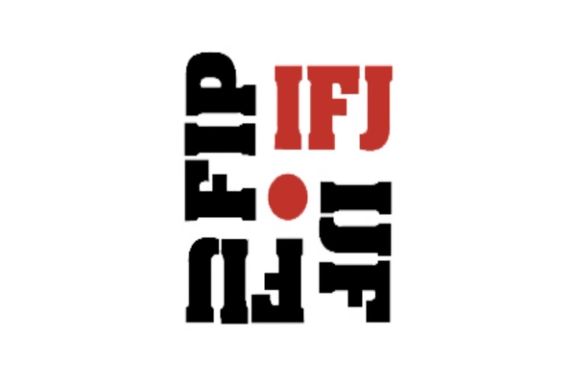
An international NGO says at least 57 journalists have been arrested in Iran since September during popular protests against the Islamic Republic.
The Brussels-based International Federation of Journalists said on Tuesday only 30 of the 57 detained journalists have been reportedly released so far.
According to the Federation, five journalists were serving their sentences in Iranian prisons before protests erupt following the death of Kurdish woman Mahsa Amini in police custody in mid-September.
In the past months, the International Federation of Journalists issued several statements calling on the Iranian authorities to end arrests of journalists and to release those imprisoned immediately.
Anthony Bellanger, Secretary General of the Federation of Journalists said, “We ask the Iranian authorities not to use the coverage of national protests as an excuse to suppress the media. Every citizen in Iran has the right to know what is going on.”
He went on to say that “Our colleagues should be released immediately and be allowed to report the events freely.”
“We remind the Iranian authorities that freedom of expression is a fundamental right of all Iranian citizens, including journalists,” underlined Bellanger.
Niloufar Hamedi, Elahe Mohammadi, and Ehsan Pirbornabash are among the journalists who are still in custody.
There are no exact figures on the number of people arrested during the protests, but some sources say nearly 20,000 people have been detained.
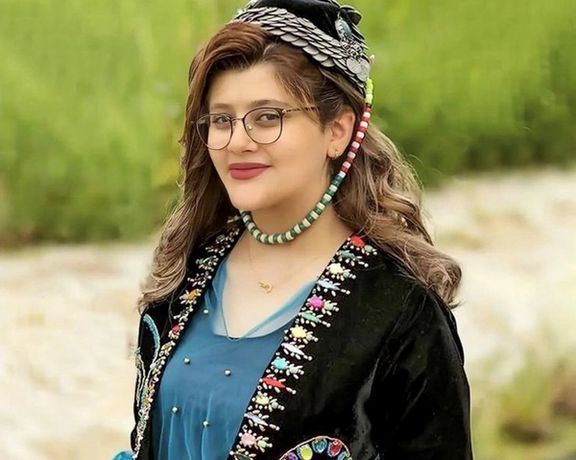
Iran appears set to be ousted from a UN women's body on Wednesday for policies contrary to the rights of women and girls, but several countries are expected to abstain.
The United States requested the vote after Mahsa Amini, a 22-year-old woman died in hijab police custody in September with deadly blows to her head. The incident triggered nationwide anti-regime protests during which more young women were killed.
The 54-member UN Economic and Social Council (ECOSOC) will vote on a US-drafted resolution to "remove with immediate effect the Islamic Republic of Iran from the Commission on the Status of Women for the remainder of its 2022-2026 term."
The 45-member Commission on the Status of Women meets annually every March and aims to promote gender equality and the empowerment of women. A US official told Reuters they had "consistently seen growing support" to remove Iran.
Iran, 17 other states and the Palestinians argued in a letter to ECOSOC on Monday that a vote "will undoubtedly create an unwelcome precedent that will ultimately prevent other Member States with different cultures, customs and traditions ... from contributing to the activities of such Commissions."
But Western countries and human rights defenders say Iran’s laws and policies severely discriminate against women and that is a universal rights issue.
Only five of the signatories to the letter are currently ECOSOC members and able to vote on Wednesday.